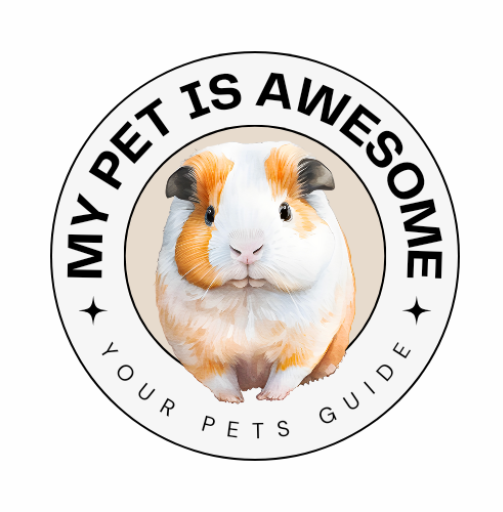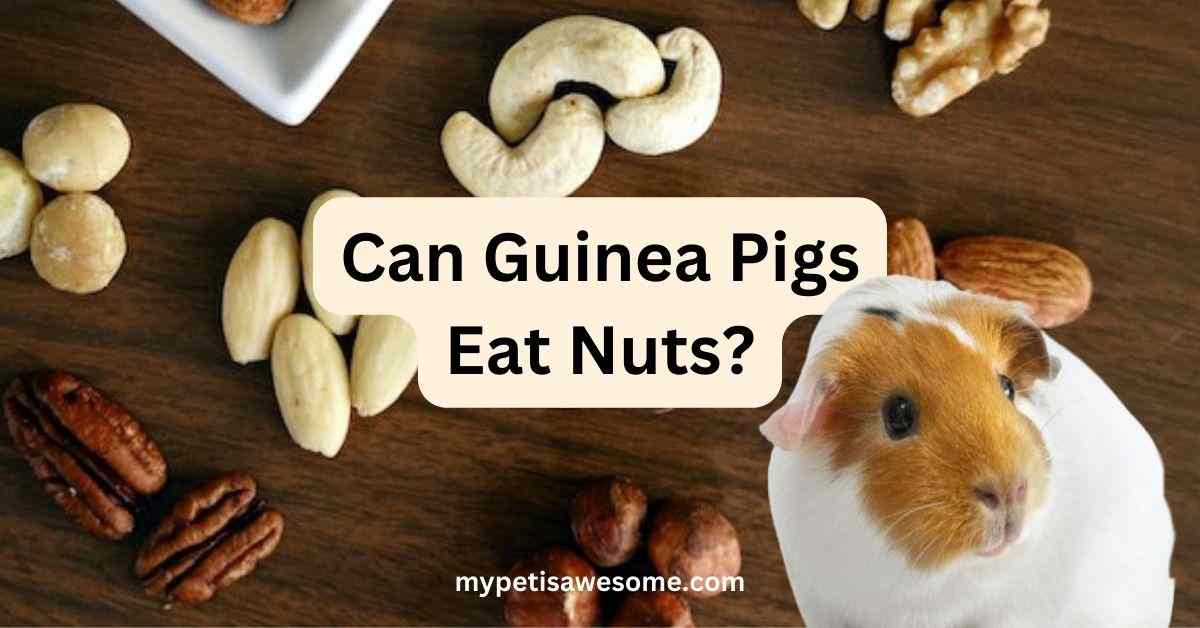Scientiests, nutrition gurus and our mums made it very clear that nuts are super healthy, cool for brain and just a perfect snack.
That logic may seem like a good reason for pet owners to try and give some nuts to guinea pigs. So you may wonder “can guinea pigs eat nuts?”.
Sounds like a good idea as hard nuts an help probably with ever-growing piggies’ teeth?
*Beep-beep-beep* Can not!
You should not give ANY nuts or nut derivatives to your guinea pig, not regular nuts like almonds, cachews or peanuts, nor exotic ones like pecans or brazil nuts as they are high in carbohydrates and fats which can lead to digestive issues.
Let’s take a look at most common nuts and reasons why cavies can not eat them.
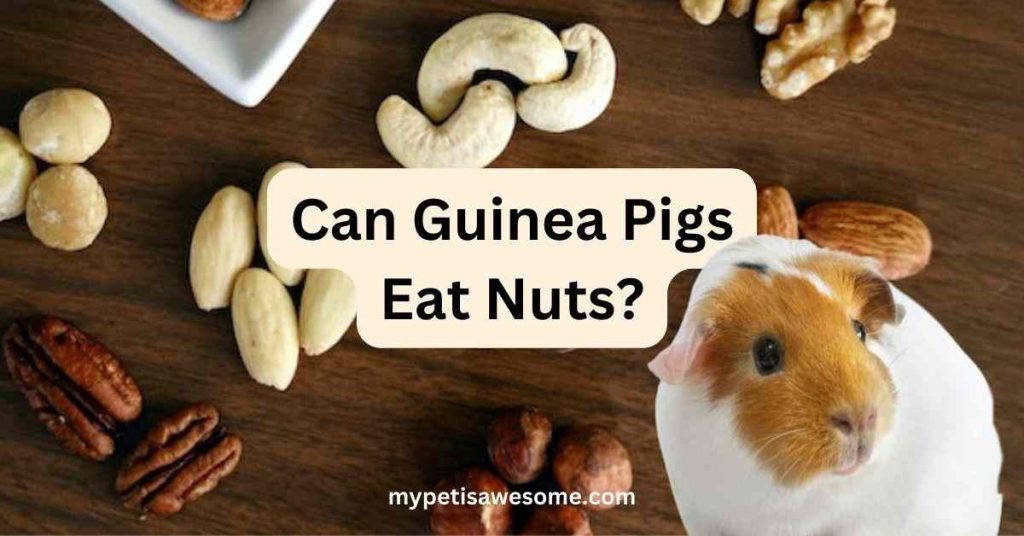
Table of Contents

Can guinea pigs eat nuts?
Nuts seem to be a great source of dietary fiber, high in magnesium, phosphorus, potassium, copper, and selenium which could have been great addition to guinea pigs diet.
| Nutrient | Almonds(28 gr) | Walnuts (28 gr) | Cashew (28 gr) | Pistachio(28 gr) | Hazelnut(28 gr) | Brazil Nut(28 gr) | Pecan(28 gr) |
|---|---|---|---|---|---|---|---|
| Calories | 160 Kcal | 183 Kcal | 163 Kcal | 159 Kcal | 178 Kcal | 157 Kcal | 196 Kcal |
| Fat | 50 g | 18.26 g | 12.43 g | 13 g | 17.2 g | 18.6 g | 20.4 g |
| Carbs | 21.43 g | 3.84 g | 8.56 g | 8 g | 4.73 g | 3.44 g | 3.94 g |
| Protein | 6 g | 4.26 g | 4.72 g | 5.89 g | 4.24 g | 5.16 g | 2.6 g |
| Fiber | 3 g | 1.9 g | 0.924 g | 2.88 g | 2.75 g | 0.936 g | 2.72 g |
| Calcium | 59.9 mg | 27 mg | 12 mg | 30 mg | 32.3 mg | 10.5 mg | 19.8 mg |
| Iron | 1.08 mg | 0.81 mg | 1.69 mg | 1.13 mg | 1.33 mg | 1.89 mg | 0.717 mg |
| Magnesium | 80.1 mg | 44.8 mg | 76.4 mg | 30.5 mg | 46.2 mg | 82.8 mg | 34.3 mg |
| Phosphorus | 150 mg | 98.1 mg | 149 mg | 131 mg | 82.2 mg | 168 mg | 78.5 mg |
| Potassium | 200 mg | 123 mg | 177 mg | 282 mg | 193 mg | 187 mg | 116 mg |
| Sugar | 1 g | 0.73 g | 1.4 g | 2.17 g | 1.23 g | 1.68 g | 1.12 g |
But at the same time, nuts, even roasted, have too much fat, calcium, carbohydrates, sugar and salt which are harmful for sensitive digestive system of adult or baby guinea pigs.
Nuts, being rich in complex carbohydrates and unsaturated fats, can harm delicate digestive systems of guinea pigs, potentially leading to digestive issues. Yet, no nuts are toxic or poisonous enough to kill a guinea pig.
Guines piggies should have low-calcium diet, especially mature to old ones, also low-fat and low-sugar diet with high fiber content.
In the wild, guinea pigs are grazers and they are not eating nuts or seeds. Nuts contain very few fiber but lots of carbs, sugar and protein and piggies don’t need those large amounts.
If you’re worried about fiber, provide enough hay – it has more fiber than nuts and is absolutely safe for pigs.
Potential risks of eating nuts for guinea pigs
- nut intolerance (allergy) manifesting in irritation, loss of fur, breathing difficulties, sneezing, etc
- diarrhea and dehydration
- digestive problems because of high fat-content, sugars and salts that guinea pigs cannot digest and it will make their gastrointestinal upset and bloated.
- diabetes and high blood sugar
- obesity risks due to high levels of fat
- hepatic lipidosis (“fatty liver” as it accumulates fat from nuts)
- stomach ache and disruption of the delicate balance of healthy bacteria – with sugar bad bacteria will grow faster.
- choking (both on nuts or butters)
- high cholesterol levels which increase risks of cardiovascular diseases, including heart attacks
- intestinal motility dysfunction
- urinary tract problems: urinary pain, or blood in the urine, infections, bladder and kidney stones or even kidney failure due to a lot of calcium and calcium/phosphorus inbalance in nuts
- potential damage to central nervous system of Guinean pigs.
All of this being said, it doesn’t mean that your piggy can not physically chew nuts or will knowingly refuse to try them – oh no, they will sure nibble any nut!
So it is our – owners – responsibility to keep nuts out of their reach.

Can guinea pigs eat almonds?
No, guinea pigs should not eat almonds or almond butter.
Almonds contain high amounts of fat, complex carbohydrates which are difficult for guinea pigs to digest. Feeding almonds to guinea pigs can lead to digestive issues, such as upset stomach, diarrhea, or even pancreatitis.
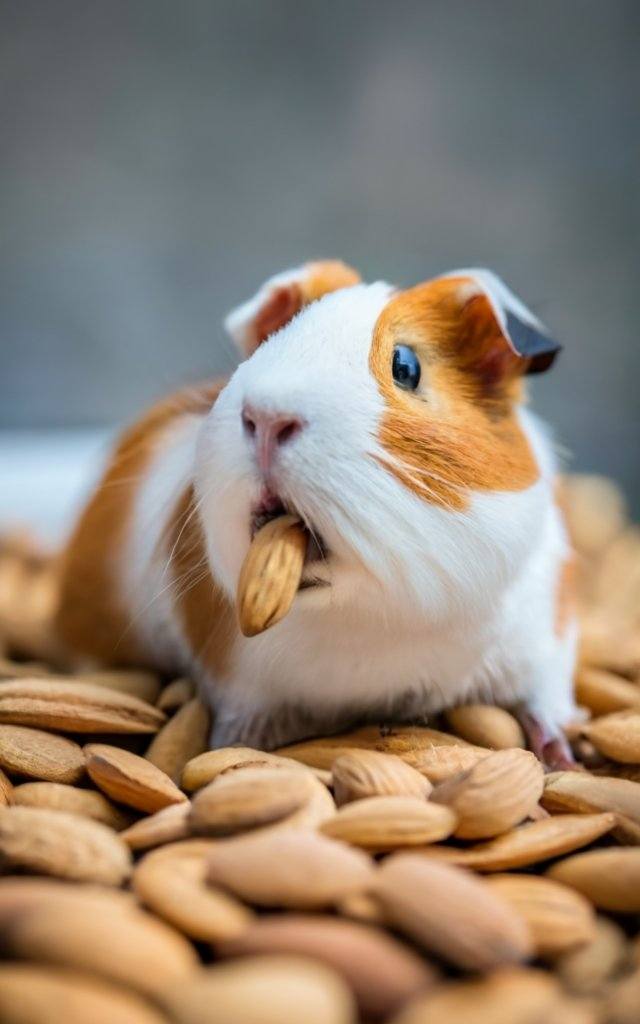
Guinea pigs cannot eat almonds for several reasons:
- High Fat Content: Almonds are high in fat, which is difficult for guinea pigs to digest. Excessive fat intake can lead to obesity and other health problems in guinea pigs.
- Digestive Issues: Guinea pigs have sensitive digestive systems. Foods high in fat, like almonds, can upset their stomach and cause diarrhea or other digestive issues.
- Calcium and Phosphorus Imbalance: Almonds contain a significant amount of calcium. While calcium is essential for guinea pigs and good for young piggies, but an imbalance between calcium and phosphorus (also found in almonds) can disrupt their mineral balance, leading to health problems. In older cavies, excess in calcium can lead to urinary issues like bladder stones.
- Choking Hazard: Almonds are hard and quite big for small pets like guineapig and can pose a choking hazard, especially if not properly chewed.
- Toxic Coating: Some almonds have a coating of salt or other seasonings, which are harmful to guinea pigs. But even plain, unsalted almonds are not suitable for them.
If you gave small amounts of almonds before your read this article, it is ok, one-time moderate serving portion will likely not cause a lot of harm.
It’s best to stick to their regular diet of hay, fresh vegetables, and guinea pig pellets to ensure they stay healthy and happy.

Can guinea pigs eat peanuts?
Guinea pigs should not eat whole peanuts or peanut butter.
While they are not commonly allergic to peanuts, the main reason peanuts are unsuitable for guinea pigs is their high-fat content.

Peanuts are rich in fats (saturated fatty acids), which are challenging for guinea pigs to digest and can lead to obesity and shorten their life.
In terms of nutritional value, peanuts are a good source of protein, healthy fats, and various vitamins and minerals for humans.
But guinea pigs have different dietary needs than humans, and their digestive tract is not equipped to handle high-fat foods.
This also doesn’t apply to peanut shells that are simply empty calories so there is no point of giving them to piggies.
Consuming peanuts, even in small amounts, can lead to digestive problems, obesity, and other health issues in guinea pigs.
Peanuts and peanut butter may also provoke chocking.

Can guinea pigs eat walnuts?
Walnuts are nuts that are commonly consumed by humans. They are rich in omega-3 fatty acids, protein, antioxidants, and various vitamins and minerals.
My friend always confused walnuts and hazelnuts so I say walnuts are the ones that look like brain…and they are actually good for brain 🙂
While walnuts offer nutritional and health benefits for humans, they are not suitable for guinea pigs.
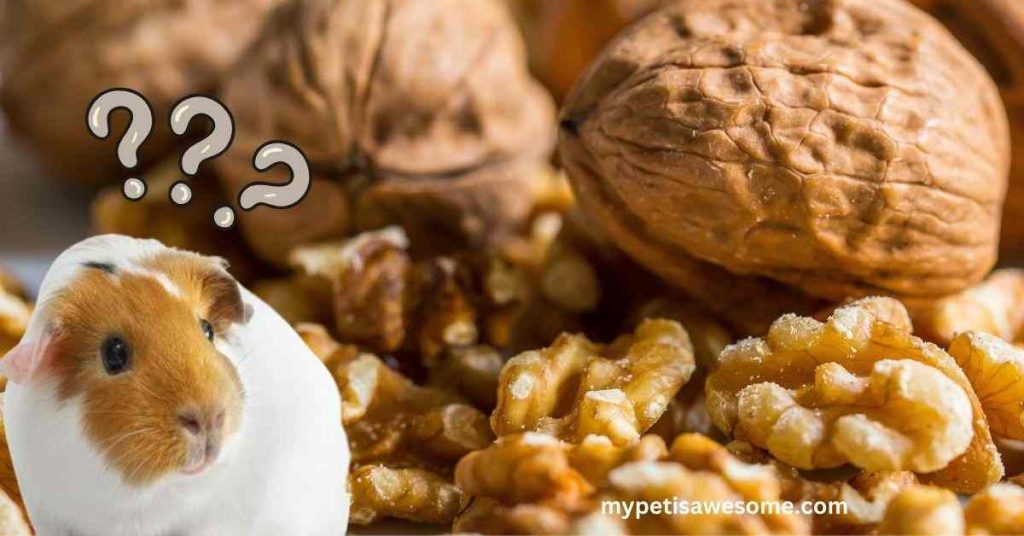
Guinea pigs have sensitive digestive systems are not designed to handle high-fat foods like walnuts (or any nuts).
Here’s why walnuts should be avoided for guinea pigs:
- High Fat Content: Walnuts are high in fat, which can be challenging for guinea pigs to digest. Excessive fat intake can lead to obesity and other health problems in guinea pigs.
- Phosphorus Content: Walnuts contain phosphorus, which is an essential mineral, but an imbalance between phosphorus and calcium in a guinea pig’s diet can disrupt their mineral balance, potentially leading to health problems like bladder stones or kidney stones. This is especially dangerous for older cavies.
- Digestive Issues: Guinea pigs have sensitive digestive systems. Foods high in fat, like walnuts, can cause digestive upset, leading to diarrhea, stomach pain, or discomfort. And for piggies good stool is vital as they eat it to reabsorb some essential nutrients.
So unfortunately, a balanced diet for your small furry friend cannot include walnuts.

Can guinea pigs eat cashews?
Guinea pigs should not be fed cashews or cashew butter because they are high in fat and phosphorus, which can be harmful to their health.
To be fair, some say cashews are drupes and not “true” nuts and you actually can rarely give them to your cavy as a treat. But they are not competitive in terms of nutrition with veggies or hay.
They contain very few fiber that is crucial to daily piggies’ diet.
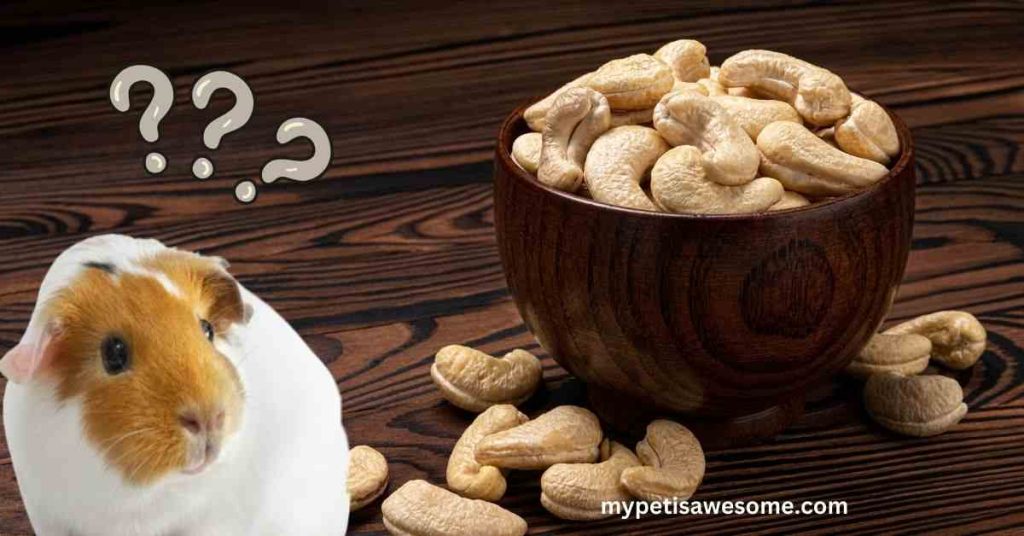
Here’s some reasons why cashew nut is not a good food for guinea pigs’ diet:
- High Fat Content: Cashews are rich in fats, which are difficult for guinea pigs to digest. Excessive fat intake can lead to obesity, digestive issues, and other health problems in guinea pigs.
- Imbalance of Phosphorus and Calcium: Cashews contain a high amount of phosphorus. While guinea pigs need phosphorus, an imbalance between phosphorus and calcium in their diet can disrupt their mineral balance, potentially leading to health problems like bladder stones.
- Choking Hazard.
- Unfamiliar Food: Guinea pigs have sensitive digestive systems, and introducing unfamiliar or fatty foods like cashews can upset their stomach and cause digestive distress.

What happens if guinea pigs eat nuts?
If your guinea pig accidentally ate a small piece of almond, monitor them closely for any signs of distress or changes in behavior.
In most cases, a small nibble might not cause immediate harm, but it’s still essential to keep a close eye on your pet.
However, if your guinea pig has ingested a significant amount of nut or is showing signs of distress, you should take the following steps:
- Contact a Veterinarian: Call your veterinarian immediately and describe the situation. They can provide specific advice based on your guinea pig’s health and the quantity of almonds consumed.
- Observe Your Guinea Pig: Keep a close watch on your guinea pig for any strange behavior, changes in appetite, lethargy, diarrhea, or signs of discomfort. If you notice any of these symptoms, it’s crucial to seek prompt veterinary care.
- Do Not Offer More Nuts: Avoid giving your guinea pig any more nuts or any other unfamiliar foods. Stick to their regular diet to prevent further complications.
- Hydration: Ensure your guinea pig has access to fresh, clean water. Encourage them to drink.
- Vet Visit: If your guinea pig shows any signs of illness or discomfort, take them to the vet as soon as possible. Even small amounts of nuts can cause digestive upset in guinea pigs, so it’s essential to have them checked by a professional.

What nuts are safe for guinea pigs?
No nuts are considered safe for guinea pigs to consume.
Guinea pigs have delicate digestive systems, and nuts are high in fat and phosphorus, which can lead to various health issues such as obesity, digestive problems, and mineral imbalances.
It’s best to avoid feeding guinea pigs any type of nuts to ensure their well-being and prevent potential health complications.
Forbidden nuts for guinea pigs:
- almonds
- peanuts
- walnuts
- pistachio
- hazelnuts
- cashews
- pecan nuts
- brazil nuts
- macadamia nuts
- coconuts (not completely nut but still worth mentioning)
- pine nuts
- any other nuts 🙂
Read also: Can Guinea Pigs Eat Parsnips? Safe serving, Risks & Benefits

Alternatives to nuts for guinea pigs
For guinea pigs, there are specific nut alternatives that not only provide dental benefits but are also low in fat.
These options help wear down their ever-growing teeth and maintain overall oral health:
- Timothy Hay: High-quality hay, especially Timothy hay, is an essential part of a guinea pig’s diet. Chewing on hay helps grind down their teeth naturally and provides necessary fiber.
- Chew Toys: Providing guinea pigs with safe chew toys made of wood, specifically designed for small animals, can help keep their teeth healthy. Wooden chew toys encourage gnawing, which wears down their teeth.
- Apple or Willow Branches: Guinea pigs enjoy gnawing on fresh, pesticide-free apple or willow branches. These branches not only serve as a natural chew toy but also help with dental wear.
- Fresh Vegetables and Fresh Fruit: Crunchy vegetables like carrots and celery can provide a mild abrasive action as guinea pigs chew, assisting in naturally wearing down their teeth.
- Herbs: Fresh herbs like parsley and cilantro can be given in moderation. Chewing on herbs provides a satisfying texture and contributes to dental wear.
- Grass: Fresh grass, free from pesticides and chemicals, is a natural and safe option for guinea pigs to chew on. It helps with dental health and provides enrichment.
These alternatives not only address the dental needs of guinea pigs but also offer additional nutritional benefits.
Regular access to these items can contribute to maintaining healthy teeth while keeping fat intake low, promoting overall well-being for your guinea pig.

FAQ
Can guinea pigs have nuts and seeds?
Unfortunately, guinea pig’s dieat should never include any nuts, grains, seeds or dried fruits as they lead to digestive and urinary problems.
Can guinea pigs have almond milk?
Almonds, almond milk and any almond-base food are forbidden for guinea pigs. If you want to give your piggy some milk try a special milk replacer. Even regular milk is not good for guinea pigs.
Are guinea pigs allergic to almonds?
Almonds or other nuts are not toxic for guinea pigs, but some creatures with sensitive digestion can had an allergic reaction to nuts. If you notice strange behavior, breathing difficulties, sneezing, loss of fur or itching, call the vet and stop feeding nuts immediately.
To Sum Up
I remember that my piggies always loved to nibble on something. Something has to be chewed on.
At some point I was thinking about nuts as I saw some nuts/seeds bars in a pet shop and thought that this may entertain them for a while.
Little did I know (it was almost 12 years ago, what Google?!) that nuts are simply not safe for my little babies.
It is clear now that guinea pigs should not be fed nuts of any kind, including almonds, cashews, and walnuts or any exotic types of nut, any nut-based butters or milk.
While nuts offer nutritional benefits for humans (and my favorites are hazelnuts), they are high in fat and phosphorus, making them dangerous for guinea pigs.
Introducing nuts into their diet can lead to a range of health problems such as obesity, digestive issues, mineral imbalances, and even potential choking hazards due to the hardness of nuts.
Instead of nuts, as guinea pig owners we should focus on providing a balanced diet that includes high-quality hay and grass, fresh safe vegetables, and guinea pig pellets specifically formulated to meet their nutritional needs.
Let’s keep things simple.
If you offer safe chew toys or fresh branches to help guinea pigs naturally maintain their dental health, your cavy should happily popcorn for you and they will actually miss such a great time with you!
As always, please consult with a veterinarian if you already noticing some weird behavior or you think that your piggy ate some nuts.
